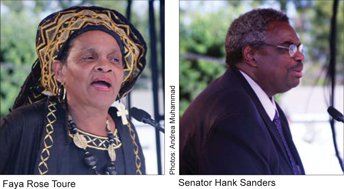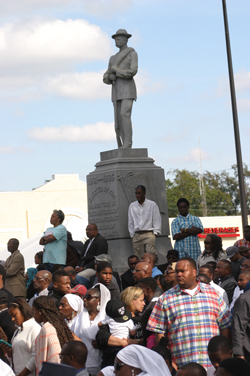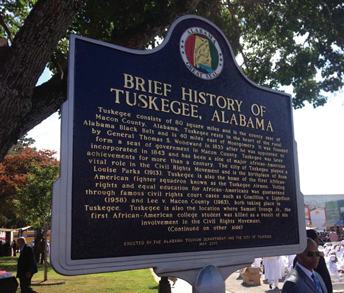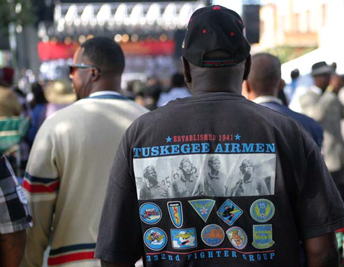Million Man March Commemoration, Holy Day brings optimism to the Deep South
By Ashahed M. Muhammad -Assistant Editor- | Last updated: Oct 29, 2013 - 1:29:26 PMWhat's your opinion on this article?

|
Leaders like Atty. Faya Rose Toure, founder of the Selma, Ala.-based Bridge Crossing Jubilee Voting Rights Caravan, and a consistent freedom fighter, passionately spoke about the continued battle against racial oppression prior to the keynote address at the Holy Day of Atonement and Million Man March anniversary here Oct. 20 and during weekend sessions and conferences.
Despite efforts to separate them from Minister Louis Farrakhan of the Nation of Islam, who brought the event to Alabama, “They will never divide us!” she declared.
Unity, shared struggle and optimism were hallmarks of weekend discussions and words from powerful leaders facing serious issues. Vestiges of racism still present in the Deep South were even found in Tuskegee Square, where the commemoration was held. In the center of the square was a statue paying tribute to Confederate soldiers.

Statue erected to honor the Confederate soldier in Tuskegee Square. Photo: Tim 6X/The Final Call
|
According to the Kids Count data center, a project of the Annie E. Casey Foundation, the South remains the epicenter of a child poverty crisis and statistics in the Deep South, are particularly troubling. In such areas as education, health insurance coverage for children, and child poverty, the center ranked Alabama 44th, Georgia 43rd, Louisiana 46th, Mississippi 49th and South Carolina 45th. The lower the number, the worse the problem, according to analysts. Mississippi recently joined 25 other states—including many Southern states—that declined federal funding to expand Medicare programs. This results in more out-of-pocket medical costs and financial strain for low-wage workers struggling to make ends meet.
Abdul Akbar Muhammad, international representative of the Nation of Islam, said being in such a notable place reflecting on the works of Booker T. Washington and the works of the Hon. Elijah Muhammad was historic. A banner behind speakers onstage contained portraits of giants who struggled for Black liberation—regardless of their ideological leanings. It is through their sacrifices that a unified group can move forward to implement solutions to the issues plaguing Blacks, said Mr. Muhammad.
“The people could see it laid out before them as Student Minister Ishmael Muhammad spoke and delivered that beautiful speech with the right spirit,” he continued, referring to the keynote address delivered by a son of the Hon. Elijah Muhammad and assistant to Min. Farrakhan. “They could see that linkage even though there are differences with some Nationalists, some Christians, some Muslims, they could see there was a linkage between all of us in the struggle,” said A. Akbar Muhammad.
Vision, struggle and unity

A sign erected in Tuskegee Square noting the city’s rich history.
|
“Whenever we have vision we win, whenever we have struggle we win, whenever we have unity we win,” said Sen. Sanders. “When we can put them all together, we not only win, we prevail over every obstacle that comes our way.”
Many assumed those escaping slavery only did so at night because they wanted to prevent being detected or seen, he noted. But that was really the only time they could see the North Star to guide them, Sen. Sanders observed.
“That’s the kind of vision that we have to have now and I appreciate that kind of vision being put forward by Minister Louis Farrakhan,” said Sen. Sanders. “When we cease to fight, we cease to win, so all we have to do is just keep fighting, keep struggling, and we will win.”
The turnout in Tuskegee Square suggested many are ready for the establishment of an economic base for Black people. A standing room only crowd packed the outdoor venue, rivaling the number of actual Tuskegee residents. Some said if economic revitalization can start in Tuskegee, it can trigger a nationwide movement.
Tuskegee University professor Muhjah Shakir, a primary coordinator for the weekend’s activities, has lived in Tuskegee for 13 years. She was born and raised in Detroit and lived for a time in Oakland as an activist. Ms. Shakir sees a sort of “learned helplessness” in the South. Sometimes a major event like the Oct. 20 gathering is needed to shake things up, she said.
Some felt uncomfortable about the event coming to the sleepy eastern Alabama town, the college professor noted. “You can’t create change unless you kind of stir things up a bit and kind of force people to move out of their comfort zones, so I think that was one of the huge benefits of having the Day of Atonement and Million Man March anniversary in Tuskegee,” said Professor Shakir.
But one sign of how far there is to go was closed businesses around the square that could have benefitted from tourists, though the event was held on a Sunday, she said. There was a memorabilia shop that likely would have done brisk business, but conservatism and narrow mindedness sometimes exists in small towns, Dr. Shakir said.
Jackie Carlisle, an editor with the Tuskegee News, was born and raised in the town. She turned 43 on Oct. 20 and described it as a “spiritual and magical day.” Covering the Million Man March commemoration just a short walk from her office building on her birthday was fine with her.

Spectators enjoyed a beautiful mid-October day in Tuskegee Square to commemorate the 1995 Million Man March. Photos: Tim 6X/The Final Call
|
Many are in a “stagnant condition” but she felt the major event would “kick start and mobilize” people. Tuskegee was once a “little Black Mecca of the South,” turning out engineers and medical professionals representing a beacon of hope for Blacks all over, she noted. But, said Ms. Carlisle, many who passed through Tuskegee University failed to come back to reinvest in Tuskegee, its educational programs and its people, who remained in poverty and without needed services.
“I truly believe that God is getting ready to make not only Tuskegee and the South, he is getting ready to make some real major changes in America, and people don’t understand that it just takes that one spark for that wildfire to go forward and that is what is getting ready to happen,” she said.
INSIDE STORIES AND REVIEWS
-
-
About Harriett ... and the Negro Hollywood Road Show
By Rabiah Muhammad, Guest Columnist » Full Story -
Skepticism greets Jay-Z, NFL talk of inspiring change
By Bryan 18X Crawford and Richard B. Muhammad The Final Call Newspaper @TheFinalCall » Full Story -
The painful problem of Black girls and suicide
By Charlene Muhammad -National Correspondent- » Full Story -
Exploitation of Innocence - Report: Perceptions, policies hurting Black girls
By Charlene Muhammad -National Correspondent- » Full Story -
Big Ballin: Big ideas fuel a father’s Big Baller Brand and brash business sense
By Bryan Crawford -Contributing Writer- » Full Story






 Click Here Stay Connected!
Click Here Stay Connected!








